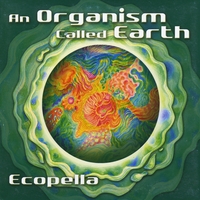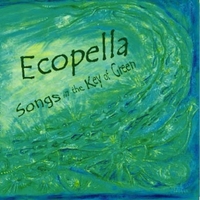

If you're in Australia we hope you will help the choir by
buying from us directly. Either CD costs $27.20 for one copy (posted in
Australia) and
$100 for five. Email Miguel or ring 02 9810-4601.
Please visit the music
page for information about the songs on these albums...or even about
our unrecorded treasures!
An Organism Called Earth (December 2002)
This was our first CD and represents four years of gathering remarkable environmental songs from Australia and overseas, arranging them for unaccompanied voices, and even green-penning a few of our own.
Our most prolific composer, and probably the most arrested member of the group, is Paul Spencer. His Organism Called Earth is a sonic tapestry, each rhythmic thread of which is dedicated to the complex diversity of earth and its millions of creatures. The personal inspiration from such richness is the resolve to “fight for my planet”.
That declaration is a powerful response to the condition of our world, and a fitting reply to the Message From Mother Earth written by English songwriter Frankie Armstrong nearly twenty years ago. Our arrangement of this solemn and beautiful work builds layers of harmony that intensify to the climactic and critical questions: “Why can’t you hear? Why can’t you see?
Whether or not we choose to see and hear the distress our world is in lies at the centre of a dialogue composed by Leon Rosselson, also from England, in which we look Across The Hills at the prospect of the ultimate environmental catastrophe - nuclear war. The uneasy tension between fear and repose continues in the poetry of Nigel Gray set to more music by Rosselson. This chilling lullaby isn’t likely to help you Sleep Well.
And if uranium were not a fearful enough substance there is also Asbestos. The number of deaths caused by asbestos related diseases is due to reach its peak by 2010. Emery Schubert’s wonderfully expressive arrangement of this song contains some very fine original work.
Not only is our environment Fragile, so are the human beings who defend it and each other. Sting’s moving tribute to Ben Linder - a peace activist murdered by US sponsored mercenaries in Nicaragua - is skilfully arranged by Christina Mimmocchi for whom, as for many others, it carries wider resonances.
Yet loss and grief are not the end. Particularly when we are joined with others, be they lover, daughter, friend or caring stranger, we can find a greater depth of purpose after suffering setbacks. In Come Away With Me Tony Eardley started out writing a love song but it became also a lament for our forests, and a passionate determination to stand firm in a community of resistance.
A different kind of forest community is responsible for our next offering. The three songs of the Ambore Medley come from the Sepik River region of Papua Niu Gini and were brought to Australia in 1995 by Henrik Ason, a member of the Raunisi Theatre Group in Wewak. His visit was part of a campaign called 'Big Bush Bugarup' exposing the depredations of the logging industry in PNG. The songs were collected from the Bondna people living in the mountains 'half an hour's walk from where the road ends', and arranged by Raunisi. Additional harmonies were written by Jean Anne Jones and Miguel Heatwole, both then members of the Solidarity Choir in Sydney Australia.
Ambore is about hunters and gatherers returning from the forest to their village and children. A steady increase in volume depicts the growing excitement at their approach. Pe Pe Pe Pelesi Imo, a song handed down through several generations of Bondna elders, reminds us how transient our lives are compared with those of ancient forests. Emo Kikimo finishes the medley on a celebratory note, expressing the joy of people who live in harmony with their forest home.
We hold on to this upbeat mood as we look at various forms of environmental activism. In Green Like Me, another of Paul Spencer’s songs, we have a chuckle at people whose green credentials appear rather pale when given daily examination, and hope we aren’t laughing at ourselves!
Another local songwriter, Margaret Bradford, demonstrates what we can more usefully achieve in our day-to-day lives: wrapping some very practical advice about household water conservation in a lively and humorous musical package. Miguel Heatwole's jazzy choral arrangement of Drip Drop makes the most of the onomatopoeic possibilities.
Turning again to Paul, we find him inviting us to Make Some Music and join in a chorus consisting of: banner drops - when activists scale the heights of a tall building to hang a banner with a message on it; lock on pipes - used by protestors to handcuff themselves to bulldozers and such; tripods and canoes - the first a form of flimsy roadblock on which a brave individual risks being injured by the wheels of ‘progress’, the second used to picket visiting warships, or vessels carrying rainforest timbers or nuclear waste. We also ought to explain for the benefit of listeners from other countries that in Australia the Liberal and Labor parties are comparable to the Republicans and Democrats in the USA and the Tories and Labour in Britain. Not much to choose from.
In Roads, Traffic And Authority Paul employs a quick satirical wit to show the foolishness and danger of authority’s addiction to the motor car. It could well be said that he follows in the footsteps of Tom Lehrer whose 1960s classic, Pollution, is one of the earliest, and wittiest environmental songs ever penned. Laugh ‘til you cough, but save some for its companion piece Air by Galt MacDermot, James Rado and Gerome Ragni. From the 1960s 'American Tribal Love Rock Musical' Hair, this song is an upbeat critique of our society's production of airborne toxins. Ecopella does not perform nude!
We turn now to two pieces that in different ways express a general joy and wonder at the world. Roy Gullane of Scotland’s Tannahil Weavers, in a work arranged by our Terry Clinton, helps us keep in mind the worthiness of every victory achieved in the struggle for a Land Of Light. And taking a long view from the depths of space we may see Fay White’s majestic, slow and solemn tribute to the ancient beauty of the Universe's Daughter.
We conclude with the thought that however heavy the losses endured by our earth, however powerful the greed and stupidity that poison it, there is absolutely no point in giving up. The worst thing you can do is nothing. The best thing you can do is find good people and Stand Fast.
Songs In The Key Of Green (March 2008)
Welcome to Ecopella’s celebration of a decade of environmental harmony! We’d been looking forward to our second album for quite a while - although for rather less than Five Hundred Years. The story behind our opening track concerns a 16th century church in England whose builders planted an oak nearby so its timber could replace the roof’s central beam in the event of fire.
Such vision is rare these days - nowhere more so than in the NSW government which prefers the property developers’ quick buck to the environmental concerns of local communities. We want to bring its attention back to earth and Put It On The Ground.
You already know the slogan: think globally, act locally. Dominating our global thoughts is the threat of catastrophic climate change as our grieving planet sheds Ice Tears. Limiting the resources we consume - particularly those carrying a high cost in carbon emissions - seems an obvious response to Living In One World. Until its defeat in 2007 the Howard government’s dishonest refusal to sign the Kyoto protocol obliged thoughtful Australians to make do with their own individual efforts at reducing greenhouse gases. My Kyoto points to some of these, and boasts more widely about the ethical use of resources.
Activists however recognise a paramount need to seek change at a higher political level than that of the individual or household. Given the weight of opposition and inertia they face it seems inevitable that they’ll grow Weary. If more people shared the load we might well create for them the occasional opportunity for a well-deserved rest.
Until then many of us will feel Restless and raise our voices against the disaster of war. Throughout history armed conflict has agonized not only humanity but also brought horrific destruction to the natural environment. In past centuries Europe lost much of her forests to navies of wooden ships - while in Ireland the woods near Bonny Portmore were razed because they also offered concealment to guerrilla fighters resisting the British occupation.
Turning our focus homeward we find a different kind of war as protesters campaign for Australia’s old growth forests. Machines Are Closing In was written by one of our members to commemorate a battle in which he took part. Australian waterways too are threatened and Murrumbidgee Water invites us to understand better how the Wiradjuri people have honoured the river and the life it brings. In Tasmania hydro electric dams destroyed the trout-fishing phenomenon known as The Shannon Rise and flooded the original Lake Pedder. Threatened with a similar fate the Cataract Gorge near Launceston was saved by the vigorous action of wilderness advocates.
These waters flow into the ocean, and following them out to sea we achieve a soaring and rather elegant perspective on the conservation of marine bird life on the Wings Of A Seabird.
Back on land, the Eroded Hills of New England inspired a moving, if bleak, spectacle from one of Australia’s revered 20th century poets. We follow this with our own Ode To Soil which honours the substrate with more upbeat sentiments. The agricultural aspects of this earthy theme supply even more levity as we discover that in America The People Are Scratching after disrupting the ecological balance with pesticides. Another satirical warning is sounded by certain Vegetables From Hell, this time against interfering genetically with the earth’s produce.
The planet we inhabit has incredible beauty and our wish to preserve All The Wild Wonders it contains brings this collection to a close. We hope that you enjoy our music and will support the cause it serves. This will not be the last you hear of us. We have so much work to do.
Use this link to contact current webmaster.

